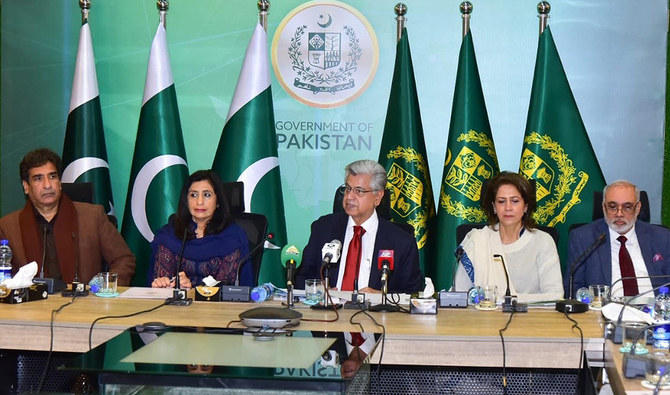By Staff Reporter
ISLAMABAD: With less than a week to go before national elections, the caretaker government said on Saturday that it had put in place a “three-tiered system” of security to protect the voting process from militant attacks, which have increased in recent weeks.
The country of more than 230 million people is preparing to elect a new parliament and prime minister on Feb. 8, amid a wave of suicide bombings and other assaults by Islamist extremists in its northwestern and southwestern regions that border Afghanistan.
The Election Commission of Pakistan, which oversees the polls, has said that security personnel, stationed outside the polling stations, will be responsible for guarding the ballot papers and boxes, as well as transporting them safely to and from the counting centers.
“We have very good arrangements to ensure the security and integrity of the process, providing security to polling stations in a three-tiered system,” Murtaza Solangi, the caretaker information minister, told journalists at a briefing in Islamabad, the capital.
Solangi said that the police would take the main responsibility in the first layer, covering the polling stations, while the civil armed forces, such as the Rangers and the Frontier Corps, would form the second layer on the outer perimeter.
The Pakistan Army, he said, would act as the main quick reaction force in the third layer, ready to intervene in case of any trouble.
The caretaker minister said the country had enough resources to ensure a peaceful, free and fair conduct of the elections, adding that the army’s rapid response teams would be able to reach any troubled spot in less than 10 minutes.
Some 92 international observers from various organizations and countries, including Russia, Japan, South Africa, Zimbabwe, the Netherlands, Malaysia, Hungary and Sweden, have been issued visas to monitor the election process, along with more than 100 foreign journalists.
The elections are seen as a crucial test for Pakistan’s democracy, which has been marred by military coups, political instability and corruption. The election campaign has been overshadowed by the rising violence and attacks, targeting candidates and supporters of various political parties, including the Pakistan Peoples Party, and the Pakistan Tehreek-e-Insaf.
At least eight people were killed and over a dozen others injured in attacks on political rallies and offices of political parties last week, mostly in Balochistan and KPK provinces.
The perpetrators have not been identified, but some analysts have blamed militant groups.
The caretaker government has approved the deployment of 277,000 army soldiers, to ensure the safety of the voters and the candidates.
Minister Solangi also said the economic reforms, based on the recommendations of the Special Investment Facilitation Council (SIFC), and initiated by his interim government would be endorsed by the incoming government.
“The same political forces that endorsed these economic initiatives are about to return to parliament in a few days,” he said. “So I have full faith that these economic initiatives will continue, and our relationship with our partners in the Gulf and elsewhere, including China, will deepen.”
The minister claimed that Pakistan had stabilized economically in the last five months, thanks to the measures taken by the interim government, which assumed power in August.
“When the caretaker setup took over the charge, the official interbank rate of a US dollar was Rs296. Whereas, in the open-market we couldn’t find a US dollar for Rs350-400, and there was speculation that it could go to Rs500,” the minister said.
“However, because of the administrative measures and efficient working of the government systems, we have stabilized the economy and the currency.”
One of the major achievements of the interim government, Solangi said, was the approval of the Federal Board of Revenue (FBR) reforms and the Strategic Canals Vision 2030 by the Apex Committee of the SIFC on Friday.
The FBR, which has been criticized for its poor performance, corruption and low tax-to-GDP ratio, will be restructured and digitized under the new reforms. A Federal Tax Policy Board will be established to oversee the tax policy, set revenue targets and coordinate with stakeholders. The board will be chaired by the finance minister and will include federal secretaries of finance, revenue, commerce, the chairman of the National Database and Registration Authority (NADRA), and experts from related fields.
The FBR will also be split into two separate departments: Customs and Inland Revenue, each headed by a director general with full authority over administrative, financial and operational matters. The director generals will ensure the implementation of international best practices in terms of digitization, grievance redressal and transparency.
The Strategic Canals Vision 2030, a plan to develop and modernize the irrigation system of Pakistan, which relies heavily on the Indus River and its tributaries. The plan envisages the construction of new canals, dams and reservoirs, as well as the rehabilitation and maintenance of the existing ones, to improve water availability, efficiency and equity for agriculture, industry and domestic use.
Copyright © 2021 Independent Pakistan | All rights reserved




